Marchés
Lors de la conception d’une intervention humanitaire et de la prise de décisions quant à l’utilisation des transferts monétaires, l’analyse générale des options de réponse doit inclure une analyse de marché. Il est prouvé qu’offrir un soutien ciblant le fonctionnement des marchés accélère la reprise et accroît la résilience dans les zones affectées par une catastrophe.
De nombreuses organisations ont investi dans la mise au point d’outils visant à faciliter l’analyse de marché et réfléchissent à la mise en place de programmes basés sur les marchés plus holistiques. Elles envisagent des interventions tirant profit du marché (basées notamment sur des transferts monétaires aux populations affectées), ainsi que des interventions soutenant directement les marchés (comme l’octroi de subventions conditionnelles aux vendeurs/euses pour la remise en condition du marché).
Initiatives associées
Contenu associé

1.2 Introduction à l’analyse de marché
Cours
Ce cours de 30 minutes offre une introduction à l’analyse de marché pour les contextes d’urgence. Il contient des contributions d'experts dans ce domaine. Ce cours a été développé en collaboration avec l'International Rescue Committee et le CALP Network et grâce au financement d’USAID/OFDA et de l’Agence Suisse pour le Développement et la Coopération. Il est destiné aux...

2.4 Un guide pratique pour l’analyse de marché
Cours
Ce cours en ligne de 3.5 heures vise à fournir aux équipes qui conduiront des analyses de marchés en contextes humanitaires une compréhension approfondie de la théorie et des étapes à suivre afin de leur permettre de comprendre le pourquoi et le comment du processus à suivre. Les participants seront guides à travers un scenario d'analyse de marchés d'urgence. Ce cours s'appuie sur...
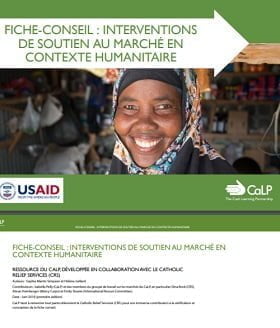
Fiche-Conseil : Interventions de soutien au marché en contexte humanitaire
Guides et outils
La fiche conseil définit le programme de soutien au marché en contexte humanitaire et le décrit dans la pratique. Elle permet aux praticiens humanitaires d’envisager systématiquement des interventions de soutien au marché, parallèlement à d’autres activités du programme. Le champ d’application comprend des interventions de soutien au marché axées sur l’offre/la disponibilité...
Thematic lead
Latest
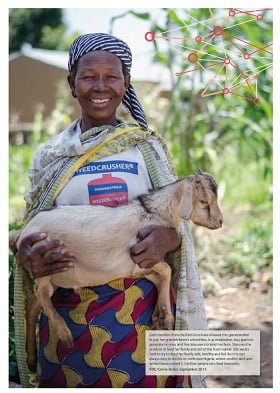
State of the World’s Cash 2020 – Chapter 5: Coordination
Report
There has been very limited progress on cash coordination since 2017. Cash continues to challenge the established coordination and funding architecture, and efforts to resolve outstanding questions around cash coordination have failed. Despite the lack of global agreement, Cash Working Groups are pushing...

Analysis of key value chains (wheat and wool), with a special focus on the light manufacturing sector in Mosul
Report
DRC has commissioned this study with the end objective of providing access to market opportunities for privately-owned small and medium enterprises and job opportunities for conflict-affected men, women and youth. For that purpose, DRC has taken a marketsystem and value-chain approach to development and...
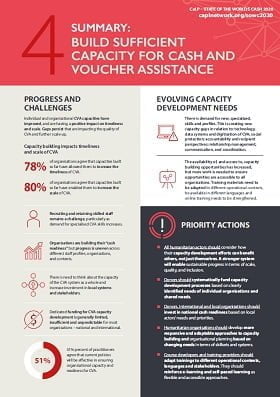
State of the World’s Cash 2020 – Chapter 4 summary: Build sufficient capacity for Cash and Voucher Assistance
Report
Since 2018 individual and organisational CVA capacities have improved, and are having a positive impact on the timeliness and scale of CVA. But dedicated funding for CVA capacity building is generally insufficient and unpredictable and recruiting and retaining skilled staff remains a challenge. This...
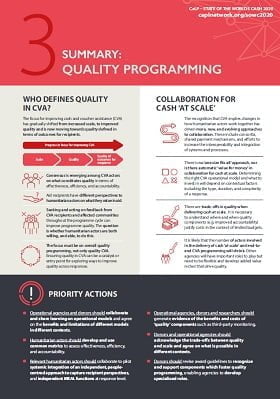
State of the World’s Cash 2020 Chapter 3 summary: Quality programming
Report
67% of practitioners report that the quality of CVA has increased in the last two years. The focus for improving CVA has gradually shifted from increased scale, to improved quality and more recently towards quality as defined by outcomes for recipients. This chapter asks: ‘How can we continue to...
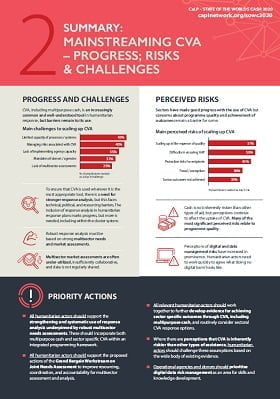
State of the World’s Cash 2020 – Chapter 2 summary: Mainstreaming CVA – progress; risks & challenges
Report
CVA is an increasingly common and well-understood tool in humanitarian response – 85% of practitioners perceive that there has been more systematic consideration of CVA over the last 2 years.This chapter asks: ‘How can ambitions for scaling up CVA be met whilst also pushing for better, more...
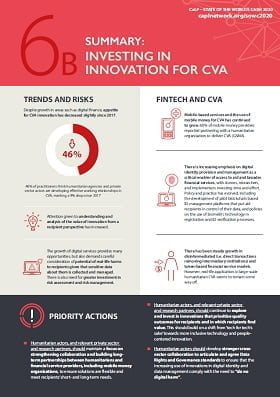
State of the World’s Cash 2020 Chapter 6B summary: Investing in innovation for CVA
Report
Since 2017, the appetite for CVA innovation has decreased slightly as has the percentage of practitioners (46%) who agree that humanitarian agencies and private sector actors are developing effective working relationships in CVA programmes. Despite this, digital finance and the use of mobile money has...
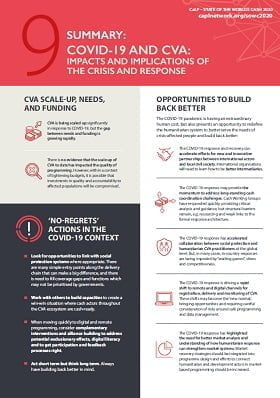
State of the World’s Cash 2020 Chapter 9 summary: Covid-19 and CVA: Impacts and implications of the crisis and response
Report
CVA is being scaled up significantly in response to COVID-19, but the overall gap between needs and funding is growing rapidly. The pandemic has incurred an extraordinary human cost, but also presents an opportunity to redefine the humanitarian system to better serve the needs of crisis-affected people....
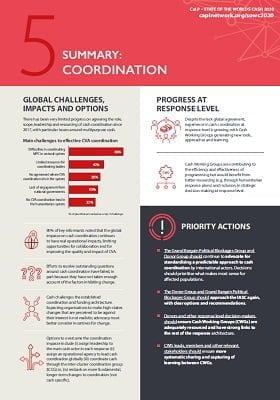
State of the World’s Cash 2020 Chapter 5 summary: Coordination
Report
There has been very limited progress on cash coordination since 2017. Cash continues to challenge the established coordination and funding architecture, and efforts to resolve outstanding questions around cash coordination have failed. Despite the lack of global agreement, Cash Working Groups are pushing...
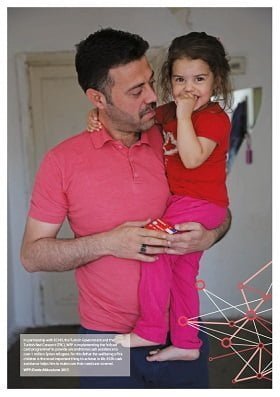
State of the World’s Cash 2020 – Chapter 4: Build sufficient capacity for cash and voucher assistance
Report
Since 2018 individual and organisational CVA capacities have improved, and are having a positive impact on the timeliness and scale of CVA. But dedicated funding for CVA capacity building is generally insufficient and unpredictable and recruiting and retaining skilled staff remains a challenge. This...
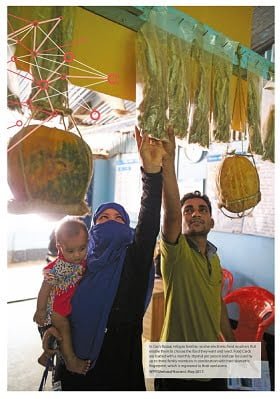
State of the World’s Cash 2020 – Chapter 6B: Investing in innovation for CVA
Report
Since 2017, the appetite for CVA innovation has decreased slightly as has the percentage of practitioners (46%) who agree that humanitarian agencies and private sector actors are developing effective working relationships in CVA programmes. Despite this, digital finance and the use of mobile money has...
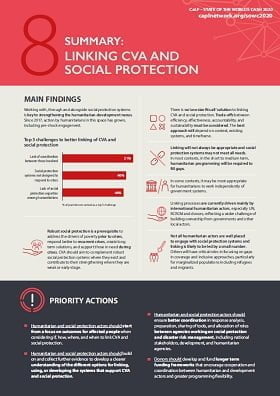
State of the World’s Cash 2020 Chapter 8 summary: Linking CVA and social protection
Report
Longstanding efforts to strengthen links between humanitarian CVA and social protection have been accelerated by the COVID-19 pandemic, with significant progress since the last report. CVA should aim to complement robust social protection systems where they exist and contribute to their strengthening...
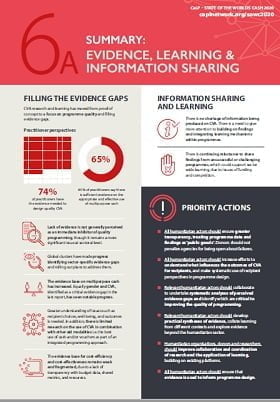
State of the World’s Cash 2020 – Chapter 6A summary: Evidence, learning & information sharing
Report
Three-quarters of practitioners agree that they have the evidence needed to design quality CVA. However some critical evidence gaps remain for example around recipient choice and wellbeing, cost effectiveness and the use of CVA in combination with other aid modalities. This chapter asks: ‘How can...
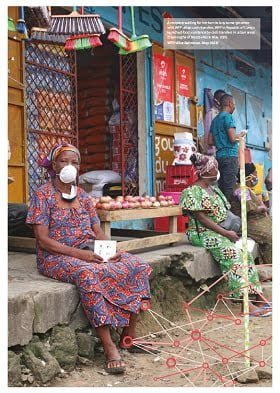
State of the World’s Cash 2020 – Chapter 9: COVID-19 and CVA – Impacts and Implications of the Crisis and Response
Report
CVA is being scaled up significantly in response to COVID-19, but the overall gap between needs and funding is growing rapidly. The pandemic has incurred an extraordinary human cost, but also presents an opportunity to redefine the humanitarian system to better serve the needs of crisis-affected people....

Cash and Voucher Assistance (CVA) and Partnership Toolkit
Guidelines and Tools
This year(2020) has called for a strong reflection on what we mean by partnership and how we work responsibly within CVA programs in support of localizaiton. For example, what do equitable and equal partnerships look like and why they are critical for accountable and quality humanitarian programs? In what...

Cash and Voucher Assistance (CVA) and Partnership Toolkit – 10 principles
Guidelines and Tools
This year(2020) has called for a strong reflection on what we mean by partnership and how we work responsibly within CVA programs in support of localizaiton. For example, what do equitable and equal partnerships look like and why they are critical for accountable and quality humanitarian programs? In what...

Cash and Voucher Assistance (CVA) and Partnership Toolkit – Partnering Project Cycles
Guidelines and Tools
This year(2020) has called for a strong reflection on what we mean by partnership and how we work responsibly within CVA programs in support of localizaiton. For example, what do equitable and equal partnerships look like and why they are critical for accountable and quality humanitarian programs? In what...

Cash and Voucher Assistance (CVA) and Partnership Toolkit – Good Practices & Guiding Questions
Guidelines and Tools
This document outlines in detail steps and considerations in Cash and Voucher Assistance (CVA) programs that are supporting of Local Humanitarian Leadership, align with principled and effective partnerships and follow minimum quality standards for partnerships across each phase of the CVA project cycle.
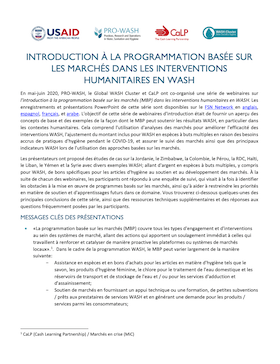
Introduction à la Programmation Basée sur les Marchés dans les Interventions Humanitaires en Wash
Guides et outils
En mai-juin 2020, PRO-WASH, le Global WASH Cluster et le CALP Network ont co-organisé une série de webinaires sur l’introduction à la programmation basée sur les marchés (MBP) dans les interventions humanitaires en WASH. Les enregistrements et présentations PowerPoint de cette série...
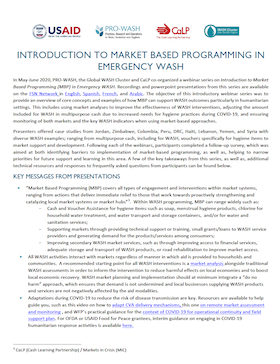
Introduction to Market based Programming in Emergency Wash
Guidelines and Tools
In May-June 2020, PRO-WASH, the Global WASH Cluster and the CALP Network co-organised a webinar series on Introduction to Market-Based Programming (MBP) in Emergency WASH. Recordings and Powerpoint presentations from this series are available on the FSN Network in English, Spanish, French and Arabic....

CVA and GBV webinar series for gender and cash subworkstream 2020
Webinar recording
Cash and voucher assistance (CVA) is now a common tool in humanitarian action used to meet the diverse needs of those displaced by crisis and conflict, and it is on the rise. Despite a push by several humanitarian actors since 2015, its use for protection outcomes – including to support the prevention...
